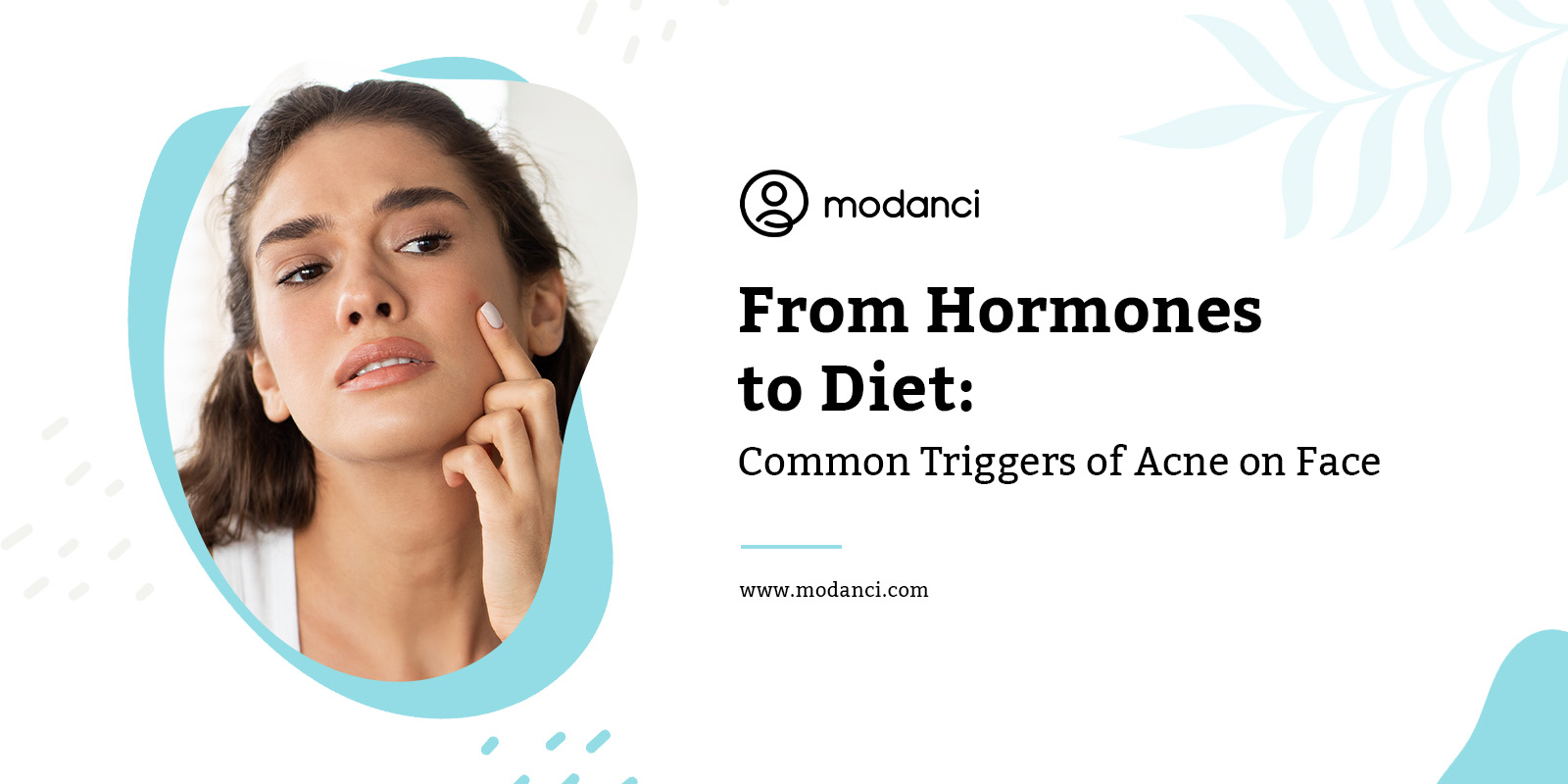Do you ever find yourself frustrated by the occurrence of red, tender bumps on your face, despite diligently following a skincare routine? These unwelcome eruptions, commonly known as acne, are often associated with teenagers but can affect individuals of any age.
Acne can be particularly troublesome if it becomes severe, as it can cause pain and even lead to scarring. Fortunately, understanding the type and underlying causes of acne can significantly reduce its recurrence. In addition, exploring Ayurvedic remedies can offer a holistic approach to treating this condition while improving overall skin health.
Continue reading to learn more about what is acne and what causes this irritating condition.
What does Ayurveda have to say about acne?
In Ayurveda, acne is referred to as “yuvanpindika” or “mukhdosha,” which translates to “face destroyer.” It occurs due to the combined imbalances of kapha, vata, and rakta dushti, which refers to the contamination of the blood tissue. It is important to recognize the interconnected influence of these factors rather than considering them as isolated causes. Therefore, the key approach should be to restore internal harmony instead of seeking temporary solutions.
Well, according to Ayurveda, acne is called “Yuvana Pidakas” and it’s all about those Doshas (life energies) getting out of whack. You see, when there’s an imbalance of the Doshas in your body, acne can rear its ugly head. This imbalance can be caused by various things, both inside and outside your body.
According to Ayurvedic principles of skin treatment, acne is caused by imbalances in the three doshas: vata, pitta, and kapha. Each individual has a unique combination of these doshas, which govern their physical and mental well-being. Any disruption in the equilibrium of these doshas can lead to various illnesses.
The vata dosha, associated with air and ether elements, is responsible for movement and creativity. An imbalance in vata can result in sluggish digestion and the accumulation of ama, which is undigested food material that blocks the proper functioning of other bodily systems.
The pitta dosha, consisting of fire and water elements, governs intelligence, metabolism, and energy. An imbalance in pitta can affect the blood and liver, leading to inflammation.
The Kapha dosha, comprising water and earth elements, represents qualities of love, nurturing, and stability. As this dosha controls sebum production, an imbalance in kapha can result in clogged skin pores and openings.
Overall, acne is attributed to poor digestion, the accumulation of ama, inflammation, and excessive sebum production. These factors create an ideal environment for microbial overgrowth. Ayurveda emphasizes the importance of addressing these internal imbalances to effectively manage acne and related allergies. In other words, achieving a healthy internal state is crucial for maintaining healthy skin externally.
So, here’s the deal with acne according to dermatology
The pilosebaceous unit, which is responsible for maintaining healthy skin, can be disrupted by hormonal changes. This disruption can cause an increase in sebum (oil) production and the buildup of dead skin cells, leading to blocked hair follicles and the formation of comedonal acne.
When comedonal acne becomes infected by bacteria called Propionibacterium acnes, it can transform into a more severe type of acne characterized by inflammation, such as pustules or nodules. The presence of pus within the hair follicles is a result of the immune system’s response, as it sends white blood cells to fight the infection.
What are the Triggers or Causes for Acne?
1. Hormonal Changes
Hormonal changes that occur during puberty and early pregnancy can lead to an increase in androgen hormone levels. This hormonal imbalance often contributes to acne problems, and some women may experience acne breakouts until their second trimester.
2. Menstruation
Hormonal imbalances during menstruation can contribute to the development of acne. When testosterone levels increase, it triggers hair growth and activates gland production, including the sebaceous glands. As a result, there is an elevation in sebum levels, which can lead to an increase in acne formation.
Furthermore, hormonal imbalances during menstruation can have broader effects on your body. They can disrupt your circadian rhythms, affect your state of mind, and impact metabolic activity. These disruptions can contribute to an increased production of toxic waste or ama as a byproduct.
In summary, hormonal changes during menstruation not only influence acne production through elevated sebum levels but can also have wider implications on various bodily functions, potentially leading to the accumulation of toxic waste.
3. Genetic Skin Disorders
Acne can be associated with genetic skin disorders. In some cases, individuals may have a hereditary predisposition to develop acne-prone skin.
4. PCOS
Women diagnosed with polycystic ovarian syndrome (PCOS) are more prone to experiencing acne. The hormonal imbalances associated with PCOS can contribute to increased sebum production and the development of acne.
5. Skincare Products and Makeup
Using skincare products that are comedogenic, meaning they tend to clog pores, can contribute to acne breakouts. It’s important to choose non-comedogenic products that do not block the skin’s natural processes.
Using excessive amounts of makeup or not handling it properly can lead to pore clogging and the erosion of the outermost layers of your skin. It is common for people to overlook the importance of thoroughly cleansing their skin to remove makeup at the end of the day. Additionally, pollution can expose your skin to harmful pathogens and contribute to the deterioration of its outermost layers.
6. Diet
There are multiple factors that contribute to skin ailments. Among these, diet plays a significant role. Particularly, the consumption of fried and junk foods can worsen the imbalances in your kapha and pitta doshas, which are biological energies according to Ayurveda. This, in turn, disrupts your blood composition and leads to the development of skin breakouts. Similarly, excessive intake of meat and dairy products can disturb dosha equilibrium and burden the digestive system. Additionally, consuming oily, spicy foods, or foods high in sugar has been associated with a higher incidence of acne in certain individuals.
7. Stress
Stress can impact hormone regulation, metabolism, and toxin accumulation in the body, potentially leading to acne breakouts.
8. Exposure to Sun, Heat or Friction
Overexposure to heat, friction, and sun can irritate the skin and contribute to acne development. It’s important to protect the skin from excessive sun exposure and minimize friction on the skin’s surface.
9. Poor Hygiene
Poor hygiene practices and a lack of a proper skincare routine can contribute to the buildup of dirt, oil, and bacteria on the skin, potentially leading to acne breakouts.
10. Medications
Some medications, such as lithium, androgenic steroids, and corticosteroids, have been associated with triggering or exacerbating acne symptoms in certain individuals. It’s important to be aware of the potential side effects of medications and consult with a healthcare professional if acne problems arise.
Conclusion
In conclusion, understanding the various triggers of acne on the face can empower us to take proactive steps towards clearer, healthier skin. From hormonal changes during puberty and pregnancy to diet choices and genetic factors, there are several common culprits behind acne breakouts.
However, it’s important to remember that acne is not a one-size-fits-all condition, and what works for one person may not work for another. This is where Ayurveda, the ancient holistic healing system, can offer valuable insights and natural remedies to address acne from within. Ayurveda emphasizes the importance of maintaining balance in our doshas, especially kapha and pitta, through mindful dietary choices, lifestyle modifications, and herbal treatments. By addressing the root causes of acne and focusing on overall skin health, Ayurveda provides a holistic approach that complements conventional skincare practices.
By combining knowledge of common acne triggers with the wisdom of Ayurveda, we can pave the way for a happier, healthier complexion and boost our overall well-being. Remember, achieving clear skin goes beyond surface-level treatments; it involves nurturing our body, mind, and spirit for a truly holistic approach to skincare.
FAQs
1. How can stress and lifestyle factors contribute to acne on the face?
Stress and lifestyle factors impact facial acne:
- Hormonal Imbalances: Stress disrupts hormones, increasing sebum production and acne.
- Inflammation: Stress triggers inflammation, worsening acne and delaying healing.
- Poor Sleep: Stress affects sleep, compromising skin health and immunity.
- Unhealthy Diet: Stress leads to unhealthy eating, promoting acne through inflammation and sebum production.
- Skincare Neglect: Stress may cause neglecting skincare, clogging pores and promoting bacterial growth.
- Touching and Picking: Stress-related habits worsen acne by introducing bacteria.
- Lifestyle Factors: Smoking, excessive alcohol, and pollutants contribute to acne.
Managing stress, maintaining a healthy lifestyle, and a consistent skincare routine are crucial for minimizing stress-related acne.
2. Are there any specific skincare products or ingredients that can trigger acne on the face?
Skincare products or ingredients that can trigger facial acne include:
- Comedogenic Ingredients: Certain oils, waxes, and petrolatum can clog pores and cause breakouts.
- Fragrances and Irritants: Skincare products with fragrances and potential irritants can worsen acne.
- Heavy Moisturizers: Rich moisturizers not suitable for acne-prone skin can clog pores and aggravate acne.
- Harsh Cleansers: Cleansers with sulfates or strong detergents can strip the skin and increase sebum production.
- Exfoliating Agents: Overusing rough scrubs or harsh chemical exfoliants can irritate the skin and worsen acne.
- Problematic Makeup: Heavy foundations, creamy concealers, and pore-clogging ingredients in makeup can contribute to acne.
Choosing non-comedogenic and gentle products is important to prevent acne triggered by skincare choices.
3. How can medications and medical conditions contribute to acne on the face?
Medications and certain medical conditions can contribute to facial acne. Medications like lithium, androgenic steroids, and corticosteroids can cause or worsen acne. Medical conditions such as polycystic ovarian syndrome (PCOS), Cushing’s syndrome, adrenal hyperplasia, and endocrine disorders can disrupt hormone balance and lead to acne. Consulting a healthcare professional is advisable when dealing with acne related to medications or medical conditions.
4. How can I determine what specific triggers may be causing the acne on my face?
To determine specific triggers causing acne on your face:
- Keep a journal of your skincare routine, diet, stress levels, and other relevant factors.
- Look for patterns or commonalities in your journal entries.
- Experiment by eliminating potential triggers one at a time and monitor your skin’s response.
- Seek professional advice from an Ayurvedic Physician if needed for a thorough evaluation and personalized guidance.
Read More:
- The Transformative Power of Skincare: Incredible Acne Scars Before and After
- Getting to the Root of Forehead Acne: Causes and Effective Treatments
- The Main Differences Between Acne and Pimples
- Blemish-Free Skin: Effective Ways to Get Rid of Acne Scars
- Saying Goodbye to Acne Marks: Tips and Skincare Treatments That Work




